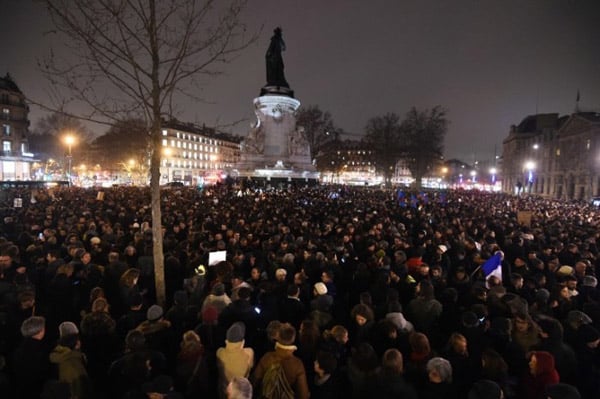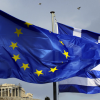
Photo: Dominique Faget-AFP via @MQLTV)
Why France now? Because France is where Charlie Hebdo and its Muhammad cartoons were published. Also, it is the most secular (but not necessarily the least religious) and most republican country in Europe. It is the society with the largest number of Muslims in the EU. It is taking part in the bombing runs against the Islamic State (IS) in Syria. And all this is related to what is happening in the Middle East, Palestine, Iraq and Syria and with the frustration generated by the Arab spring in various countries. This is an attack not only against a satirical weekly but against much more than that, as made evident by the murder of a policewomen in southern Paris and the taking and killing of hostages in a Jewish supermarket. But this can happen again anywhere else, including China, which is also in al-Qaeda’s and the IS’s sights.
Al-Qaeda or the IS? The rivalry between the two organisations to see which can do greater harm to the West is a frightening prospect and their acting in coordination –as with the terrorists in Paris– is even worse. The Kouachi brothers claimed to act in al-Qaeda’s name while Amedy Coulibaly claimed to belong to IS, and both groups have issued statements regarding the attacks. The IS had so far not operated outside Syria and Iraq against the West so this is undoubtedly a significant step up in the level of threat.
Will there be more attacks? According to the EU’s Interior Ministers, the threat is ‘real and growing’. Apparently, both al-Qaeda and the IS have encouraged the ‘lone wolves’ –who are not that lone, as some now believe that Cherif Kouachi had been trained in Yemen– to attack the West, even by ‘poisoning food and water and driving their cars into bystanders’. The latter has already occurred in various parts of the world, including Israel. Islamist terrorism is thus transforming into something even more uncontrollable. The link with Syria and Iraq is obvious, since internal events influence those outside these two countries and vice versa. Attacks like the Paris killings are a way of attracting militants to these terrorist causes. Nevertheless, European, Western and World solidarity have prevailed in the face of the attacks with the special ministerial antiterrorist meeting –which should help enhance coordination– on Sunday and the subsequent mass demonstration.
Why these young people? Many young second-generation French (or British, German or Spanish) immigrants are totally lacking in prospects. They feel marginalised, discriminated, alienated and are frequently jobless. Other young people in France, Spain and other countries have similar problems. Some join gangs or far-right groups. Others, though, become jihadists despite their education in Republican values. They feel welcome and are provided with an aim in life, in addition to the arguments and means to kill. A further complexity is that a growing number of Jihadists are converts to Islam. Any solution to the situation is likely to be slow and difficult.
Are all Muslims Charlie? No. While most Muslims in France have condemned the attack, there is an underlying discontent felt by many who consider the cartoons insult their religion and should never have been published. A recent report in Le Monde about a lycée in Saint Denis made this very clear.
Will Europe lose its soul in the attempt? Europeans do not seem to be willing to give in when it is a matter of freedom of the press, especially as regards satirical publications. But that is not the case everywhere. If Europe’s image has already had a battering on account of the economic crisis it could well happen again if freedom and the free movement of people are restricted, even if it is security that is at risk.
Will the attacks reinforce far-right extremism? In a quite exemplary way, the terrorist bomb attacks in Madrid on 11 March 2004 give rise to no anti-Muslim and xenophobic outbreaks in Spain. But now there are xenophobic and anti-Islamic movements in other countries, and some are gaining electoral strength. The Paris attacks will bolster them as well as all those who advocate hindering the entry of migrants to the EU. It was probably a mistake to fail to invite Marine Le Pen to the Paris demonstration on Sunday, as this will no doubt give her more votes. Despite considering herself a Republican, fraternity is something she does not seem to practice.
Is Islam the cause? No. The appeals of various leaders, including French President François Hollande, to refrain from criminalising Islam and the Muslims as such are a move in the right direction. But there has been a growing radicalisation of religious fundamentalism and political Islamism, especially in the Arab world and of people of Arab origin, that cannot be ignored. However, Islamism and Jihadism cannot be equated, even if the latter feeds on the former. Islamophobia is also a danger. This is one of the most complex issues of the past decade and a half. And of the future, too. It must be stressed: except for Tunisia, the Arab Spring has been a lost opportunity in all other countries.


